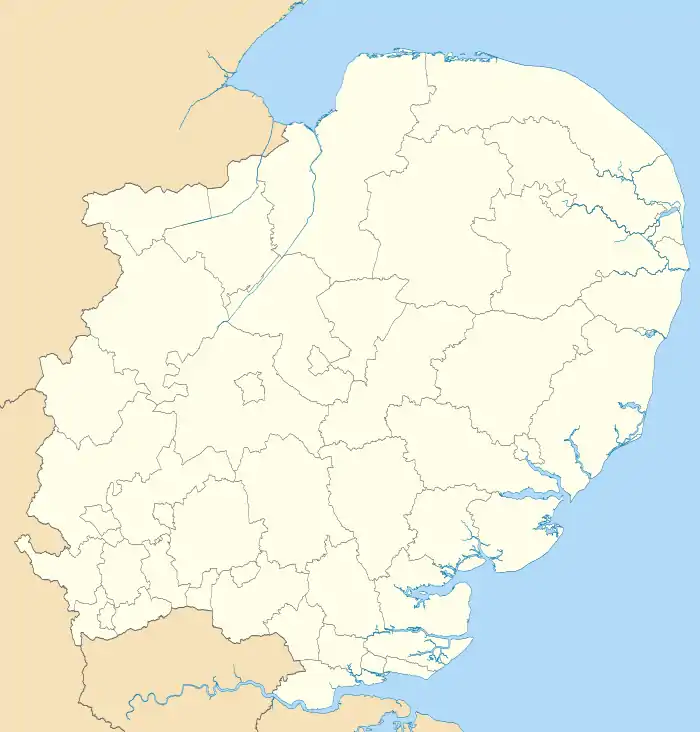City of Peterborough
The City of Peterborough,[4] commonly known as Peterborough, is a unitary authority district with city status in the ceremonial county of Cambridgeshire, England. The area is named after its largest settlement, Peterborough but also covers a wider area of outlying villages and hamlets.
City of Peterborough | |
|---|---|
| Peterborough | |
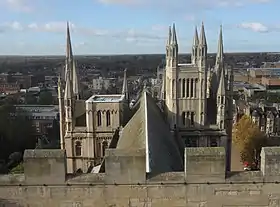 Peterborough viewed from the top of the cathedral | |
| Motto: | |
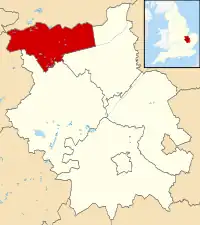 Peterborough Unitary Authority Area shown within Cambridgeshire | |
| Coordinates: 52°34′21″N 00°14′35″W | |
| Sovereign state | United Kingdom |
| Country | England |
| Region | East of England[1] |
| Ceremonial county | Cambridgeshire |
| Historic County | Northamptonshire[2] |
| Admin HQ | Peterborough |
| City status | 1541[3] |
| Incorporated | 1874 |
| Unitary | 1998 |
| Government | |
| • Type | Unitary authority |
| • Governing body | Peterborough City Council |
| • Leadership | Leader and cabinet |
| • Executive | Conservative |
| • MPs | Peterborough: Paul Bristow (Con) NW Cambs: Shailesh Vara (Con) |
| Area | |
| • Total | 132.58 sq mi (343.38 km2) |
| Population (2021) | |
| • Total | 216,349 |
| • Density | 1,600/sq mi (630/km2) |
| • Ethnicity | 75 3% White 14.3% Asian 4.1% Black 2.7% Other 3.5% Mixed |
| Time zone | UTC±0 (GMT) |
| • Summer (DST) | UTC+1 (BST) |
| Postcode area | |
| Area code | 01733 |
| Vehicle registration area code | AA, AB, AC, AD, AE, AF, AG, AJ, AK, AM, AN |
| ISO 3166-2 | GB-PTE |
| ONS code | 00JA (ONS) E06000031 (GSS) |
| OS grid reference | TL185998 |
| NUTS 3 | UKH11 |
| Website | www.peterborough.gov.uk |
The district's area covers parts of the historic counties of Northamptonshire and Huntingdonshire, as well as a small part of Cambridgeshire. In 1965, the area became part of the short-lived county of Huntingdon and Peterborough before becoming a district of Cambridgeshire in 1974. Located in the East Anglia region of England, the area borders the surrounding counties of Lincolnshire and Northamptonshire. The population of the district was 202,259 making it the second-largest district by population in East Anglia (after Norwich).[5]
Most of district was governed as part of the Soke of Peterborough, a liberty within Northamptonshire. Peterborough itself was a Saxon settlement during the Anglo-Saxon era.[6] The district also includes outlying villages such as Thorney, Old Fletton, Werrington, Parnwell, Dogsthorpe, Eye Green, Glinton, Northborough, Maxey, Wittering, Wansford and Ailsworth.
Administration
Parliamentary seat
The city formed a parliamentary borough returning two members from 1541, with the rest of the Soke being part of Northamptonshire parliamentary county. The Great Reform Act did not affect the borough, although the remaining, rural portion of the Soke was transferred to the northern division of Northamptonshire.[7] In 1885, the borough's representation was reduced to one member,[8] and in 1918, the boundaries were adjusted to include the whole Soke.[9] Recent Members of Parliament for Peterborough have included the Conservative Sir Harmar Nicholls (1950–1974), Labour's Michael Ward (1974–1979), Conservative Brian Mawhinney (1979–1997), Labour's Helen Clark (1997–2005) and Conservative Stewart Jackson, from 2005. Fiona Onasanya won the 2017 general election for Labour;[10] Onasanya was then expelled from the Labour party in December 2018,[11] but kept her seat as an independent until being ejected on 1 May 2019 after a recall petition, triggering a by-election,[12] which won by Labour's Lisa Forbes (June - November 2019).[13] The current incumbent is Conservative Paul Bristow, who won the seat in the 2019 general election.[14]
In 1997, the North West Cambridgeshire constituency was formed, incorporating parts of the city and neighbouring Huntingdonshire. The sitting member is the Conservative Shailesh Vara, who succeeded Sir Brian Mawhinney, former Secretary of State for Transport and Chairman of the Conservative Party, in 2005. Mawhinney, who had previously served as Member of Parliament for Peterborough from 1979, was created Baron Mawhinney of Peterborough in the county of Cambridgeshire later that year.
Local government
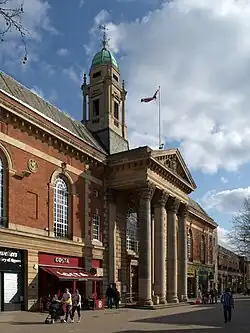
From 1889, the ancient Soke of Peterborough formed an administrative county in its own right with boundaries similar, although not identical, to the current unitary authority.[15] The area however remained geographically part of Northamptonshire until 1965, when the Soke was merged with Huntingdonshire to form the county of Huntingdon and Peterborough.[16] Following a review of local government in 1974, Huntingdon and Peterborough was abolished and the current district created by the merger of the Municipal Borough of Peterborough with Peterborough Rural District, Barnack Rural District, Thorney Rural District, Old Fletton Urban District and part of the Norman Cross Rural District, which had each existed since 1894.[17] This became part of the non-metropolitan county of Cambridgeshire.[18] Letters patent were granted continuing the status of city over the greater area.[19] In 1998, the city became autonomous of Cambridgeshire county council as a unitary authority, but it continues to form part of that county for ceremonial purposes.[20] The leader and cabinet model of decision-making, first adopted by the city council in 2001, is similar to national government.[21]
Policing in the city remains the responsibility of Cambridgeshire Constabulary; and firefighting, the responsibility of Cambridgeshire Fire and Rescue Service. The Peterborough Volunteer Fire Brigade, founded in 1884, is unique in the United Kingdom in that it functions as a retained fire station, under the control of the county fire and rescue service, but with unpaid firefighters.[22][23] The Royal Anglian Regiment serves as the county regiment for Cambridgeshire. Peterborough formed its first territorial army unit, the 6th Northamptonshire Rifle Volunteer Corps, in 1860.[24]
Health service
Following the Health and Social Care Act 2012, Cambridgeshire and Peterborough Clinical Commissioning Group became the main commissioner of health services in the city. Adult social care functions of NHS Peterborough transferred back to the city council in 2012 and public health transferred in 2013. The responsibility of guided primary care services (general practitioners, dentists, opticians and pharmacists) transferred to NHS England. In 2017 the responsibility for commissioning Primary Care Services transferred back to the CCG.[25] Cambridgeshire and Peterborough is one of the largest CCGs in the England with over 984,000 registered patients, 91 GP practices and a budget of £1.16bn in 2017–18.[26] Although predominately providing health services in Cambridgeshire and Peterborough the CCG also has practices in both Hertfordshire and Northamptonshire.
Previously, NHS Peterborough (the public-facing name of Peterborough Primary Care Trust) guided primary care services in the city, directly provided adult social care and services in the community such as health visiting and physiotherapy and also funded hospital care and other specialist treatments. Prior to the formation of the PCT, the North West Anglia Healthcare NHS Trust provided health functions within the city and before that, Peterborough Health Authority.
Peterborough and Stamford Hospitals NHS Foundation Trust became one of the first ten English NHS foundation trusts in 2004[27] and in 2017, merged with Hinchingbrooke Health Care NHS Trust to form North West Anglia NHS Foundation Trust. Although a £300 million health investment plan has seen the transfer of the city's two hospitals into a single site, the Trust has been plagued by financial problems since the move.[28] The full planning application for the redevelopment of the former Edith Cavell Hospital was approved by the council in 2006. Planning permission for the development of an integrated care centre on the site of the former Fenland Wing at Peterborough District Hospital was granted in 2003.[29] The City Care Centre finally opened in 2009[30] and the first patients were treated at the new Peterborough City Hospital in 2010.[31] The private Fitzwilliam Hospital run by Ramsay Health Care UK is situated in the landscaped grounds of the Milton Estate.[32] Cambridgeshire and Peterborough NHS Foundation Trust, a designated University of Cambridge teaching trust, provides services to those who suffer from mental health problems. Following merger of the Cambridgeshire Ambulance Service in 1994, then the East Anglian Ambulance NHS Trust in 2006, the East of England Ambulance Service NHS Trust is responsible for the provision of statutory emergency medical services (EMS) in Peterborough. The East Anglian Air Ambulance provides helicopter EMS across the region.[33]
Public utilities
The council's budget for the financial year 2018–19 is £418.7 million.[34] The main source of non-school funding is the formula grant, which is paid by central government to local authorities based on the services they provide. This was reduced by nearly 40% during the course of the 2010-15 parliament. The remainder, to which the police and fire authorities (and parish council where this exists) set a precept, is raised from council tax and business rates. This amounts to £59.5 million in 2015–16.[34] Mains water and sewerage services are provided by Anglian Water, a former nationalised industry and natural monopoly, privatised in 1989 and now regulated by OFWAT.
Following deregulation, the consumer has a choice of energy supplier. Electricity was formerly provided by Eastern Electricity, which was privatised in 1990. In 2002, the supply business was sold to Powergen (now E.ON UK) and the distribution rights to EDF Energy who sold them to UK Power Networks in 2010. Natural gas was (and still is) supplied by British Gas, which was privatised in 1986; distribution (and gas and electricity transmission) is the responsibility of the National Grid, having been demerged as Transco in 1997. These industries are regulated by OFGEM. Peterborough Power Station is a 367 MWe gas-fired plant in Fengate operated by Centrica Energy.[35]
British Telecommunications, privatised in 1984, provides fixed ADSL enabled (8 Mbit/s) telephone lines. Local loop unbundling, giving other internet service providers direct access, is completed at four out of 12 exchanges. The city is cabled by Virgin Media (previously Peterborough Cablevision, Cable & Wireless and NTL).[36] These businesses are regulated by OFCOM. Cambridgeshire County Council and Peterborough City Council are embarking on a superfast broadband project to deliver access to improved connectivity to areas where it is acknowledged that the market is unlikely to deliver.[37]
Civil parishes
The district contains the unparished areas of Peterborough, Old Fletton and Stanground North and 29 civil parishes:[38]
Demographics
Ethnicity
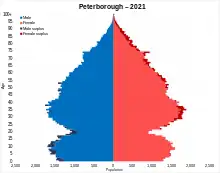
| Ethnic Group | Year | |||||||||
|---|---|---|---|---|---|---|---|---|---|---|
| 1981 estimations[39] | 1991[40] | 2001[41] | 2011[42] | 2021[43] | ||||||
| Number | % | Number | % | Number | % | Number | % | Number | % | |
| White: Total | 122,726 | 94.1% | 141,803 | 92.6% | 140,003 | 89.7% | 151,544 | 82.5% | 162,581 | 75.3% |
| White: British | – | – | – | – | 133,751 | 85.7% | 130,232 | 70.9% | 128,353 | 59.5% |
| White: Irish | – | – | – | – | 1,697 | 1,257 | 1,177 | 0.5% | ||
| White: Gypsy or Irish Traveller | – | – | – | – | – | – | 560 | 551 | 0.3% | |
| White: Roma | – | – | – | – | – | – | – | – | 938 | 0.4% |
| White: Other | – | – | – | – | 4,555 | 19,495 | 10.6% | 31,562 | 14.6% | |
| Asian or Asian British: Total | – | – | 8,560 | 5.6% | 11,400 | 7.3% | 21,492 | 11.7% | 30,801 | 14.3% |
| Asian or Asian British: Indian | – | – | 2,662 | 2,876 | 4,636 | 7,169 | 3.3% | |||
| Asian or Asian British: Pakistani | – | – | 4,752 | 6,980 | 12,078 | 16,972 | 7.9% | |||
| Asian or Asian British: Bangladeshi | – | – | 54 | 113 | 229 | 442 | 0.2% | |||
| Asian or Asian British: Chinese | – | – | 358 | 534 | 872 | 990 | 0.5% | |||
| Asian or Asian British: Other Asian | – | – | 734 | 897 | 3,677 | 5,228 | 2.4% | |||
| Black or Black British: Total | – | – | 2,009 | 1.3% | 1,928 | 1.2% | 4,164 | 2.2% | 8,751 | 4.1% |
| Black or Black British: African | – | – | 204 | 551 | 2,480 | 6,225 | 2.9% | |||
| Black or Black British: Caribbean | – | – | 1,208 | 1,118 | 1,174 | 1,419 | 0.7% | |||
| Black or Black British: Other Black | – | – | 597 | 259 | 510 | 1,107 | 0.5% | |||
| Mixed or British Mixed: Total | – | – | – | – | 2,289 | 1.5% | 4,948 | 2.7% | 7,617 | 3.5% |
| Mixed: White and Black Caribbean | – | – | – | – | 950 | 1,542 | 1,990 | 0.9% | ||
| Mixed: White and Black African | – | – | – | – | 208 | 827 | 1,627 | 0.8% | ||
| Mixed: White and Asian | – | – | – | – | 687 | 1,384 | 2,021 | 0.9% | ||
| Mixed: Other Mixed | – | – | – | – | 444 | 1,195 | 1,979 | 0.9% | ||
| Other: Total | – | – | 794 | 0.5% | 441 | 0.3% | 1,483 | 0.8% | 5,920 | 2.7% |
| Other: Arab | – | – | – | – | – | – | 428 | 897 | 0.4% | |
| Other: Any other ethnic group | – | – | 794 | 0.5% | 441 | 0.3% | 1,055 | 5,023 | 2.3% | |
| Ethnic minority: Total | 7,666 | 5.9% | 11,363 | 7.4% | 16,058 | 10.3% | 32,087 | 17.5% | 53,089 | 24.7% |
| Total | 130,392 | 100% | 153,166 | 100% | 156,061 | 100% | 183,631 | 100% | 215,670 | 100% |
Religion
| Religion | 2001[44] | 2011[45] | 2021[46] | |||
|---|---|---|---|---|---|---|
| Number | % | Number | % | Number | % | |
| Holds religious beliefs | 118,549 | 75.9 | 126,155 | 68.7 | 133,001 | 61.7 |
| 106,621 | 68.3 | 104,202 | 56.7 | 99,802 | 46.3 | |
| 254 | 0.2 | 463 | 0.3 | 617 | 0.3 | |
| 1,383 | 0.9 | 2,320 | 1.3 | 3,813 | 1.8 | |
| 147 | 0.1 | 144 | 0.1 | 185 | 0.1 | |
| 8,963 | 5.7 | 17,251 | 9.4 | 26,239 | 12.2 | |
| 833 | 0.5 | 1,184 | 0.6 | 1,348 | 0.6 | |
| Other religion | 348 | 0.2 | 591 | 0.3 | 999 | 0.5 |
| No religion | 24,388 | 15.6 | 45,183 | 24.6 | 70,066 | 32.5 |
| Religion not stated | 13,124 | 8.4 | 12,293 | 6.7 | 12,604 | 5.8 |
| Total population | 156,061 | 100.0 | 183,631 | 100.0 | 215,671 | 100.0 |
Local landmarks
The district contains many notable attractions and landmarks including: Peterborough Cathedral, Burghley House, Nene Valley Railway, and Longthorpe Tower.
References
- The nine Government Office regions formed in 1994, were adopted in place of the eight standard statistical regions during 1999. East Anglia is now defined as Level 2 Nomenclature of Territorial Units for Statistics. See Hierarchical list of the Nomenclature of Territorial Units for Statistics and the statistical regions of Europe Archived 16 January 2008 at the Wayback Machine The European Commission, Statistical Office of the European Communities (Retrieved 6 January 2008). "Europa - Eurostat - Regions". Archived from the original on 18 January 2008. Retrieved 31 August 2008.
- Parts of the current unitary authority area lie within the historic boundaries of Huntingdonshire
- Beckett, John V. (2005). City Status in the British Isles, 1830–2002. Aldershot: Ashgate Publishing. p. 14. ISBN 0-7546-5067-7. Archived from the original on 22 January 2014. Retrieved 15 March 2016.
- "Local Authority Districts, Counties and Unitary Authorities (April 2021) Map in United Kingdom". Office for National Statistics: Open Geography Portal. Retrieved 1 August 2023.
- "East Anglia | region, England, United Kingdom | Britannica". www.britannica.com. Retrieved 12 July 2022.
- Lambert, Tim (14 March 2021). "A History of Peterborough". Local Histories. Retrieved 12 July 2022.
- Formally the Representation of the People Act 1832 (2 & 3 Will. IV c.45).
- Under the Redistribution of Seats Act 1885 (48 & 49 Vict. c.23).
- Youngs, Frederic A. Guide to the Local Administrative Units of England Volume II: Northern England (Part III: Parliamentary Constituencies) Royal Historical Society, London, 1991.
- "Peterborough". Election 2017. BBC News. Archived from the original on 12 June 2017. Retrieved 12 June 2017.
- Sabbagh, Dan (4 January 2019). "Labour confirms expulsion of convicted MP Fiona Onasanya". The Guardian. London. Archived from the original on 20 April 2019. Retrieved 20 April 2019.
- Fiona Onasanya no longer Peterborough's MP Archived 18 May 2019 at the Wayback Machine. Accessed 22 May 2019.
- "Labour sees off Brexit Party in by-election". BBC News. 7 June 2019. Archived from the original on 7 November 2020. Retrieved 14 May 2020.
- "Conservatives win back Peterborough as Paul Bristow takes seat". www.peterboroughtoday.co.uk. Archived from the original on 22 May 2020. Retrieved 14 May 2020.
- Under the Local Government Act 1888 (51 & 52 Vict. c.41 Archived 1 May 2011 at the Wayback Machine).
- The Huntingdon and Peterborough Order 1964 (SI 1964/367), see Local Government Commission for England (1958–1967), Report and Proposals for the East Midlands General Review Area (Report No.3), 31 July 1961 and Report and Proposals for the Lincolnshire and East Anglia General Review Area (Report No.9), 7 May 1965.
- Under the Local Government Act 1894 (56 & 57 Vict. c.73).
- Under the Local Government Act 1972 (1972 c.70 Archived 13 April 2018 at the Wayback Machine), see The English Non-metropolitan Districts (Definition) Order 1972 (SI 1972/2039) Part 5: County of Cambridgeshire.
- Issued under the Great Seal of the Realm dated 25 June 1974, see "No. 46334". The London Gazette. 28 June 1974. p. 7419.
- The Cambridgeshire (City of Peterborough) (Structural, Boundary and Electoral Changes) Order 1996 Archived 1 May 2011 at the Wayback Machine (SI 1996/1878), see Local Government Commission for England (1992), Final Recommendations for the Future Local Government of Cambridgeshire, October 1994 and Final Recommendations on the Future Local Government of Basildon & Thurrock, Blackburn & Blackpool, Broxtowe, Gedling & Rushcliffe, Dartford & Gravesham, Gillingham & Rochester upon Medway, Exeter, Gloucester, Halton & Warrington, Huntingdonshire & Peterborough, Northampton, Norwich, Spelthorne and the Wrekin, December 1995.
- Under the Local Government Act 2000 (2000 c.22 Archived 1 May 2011 at the Wayback Machine), see Modular constitutions for English local authorities Archived 7 March 2008 at the UK Government Web Archive via at UK Government Web Archive, archived 7 March 2008, Department for Environment, Transport and the Regions, February 2001.
- "Peterborough Volunteers Fire Brigade". www.cambsfire.gov.uk. Cambridgeshire Fire & Rescue Service. Retrieved 1 January 2022.
- Walton, Jemma "Meet Peterborough's Volunteer Fire Brigade team" Archived 19 March 2012 at the Wayback Machine, Peterborough Evening Telegraph, 26 July 2007.
- "Volunteer soldiers mark unit's centenary year" Archived 9 April 2008 at the Wayback Machine, Peterborough Evening Telegraph, 3 April 2008.
- Cambridgeshire and Peterborough CCG Primary Care Commissioning Committee Archived 13 May 2019 at the Wayback Machine commissions primary medical (GP) services for the people of Cambridgeshire and Peterborough.
- About us Archived 13 May 2019 at the Wayback Machine Cambridgeshire and Peterborough Clinical Commissioning Group.
- The annual health check: assessing and rating the NHS Archived 28 November 2007 at the Wayback Machine (pp.22, 34 & 69) Commission for Healthcare Audit and Inspection, October 2006.
- Peterborough and Stamford NHS trust rescue plan outlined Archived 24 October 2018 at the Wayback Machine BBC News, 12 September 2013.
- Greater Peterborough Health Investment Plan Archived 8 January 2008 at the Wayback Machine Peterborough and Stamford Hospitals NHS Foundation Trust, Peterborough Primary Care Trust and Cambridgeshire and Peterborough Mental Health Partnership Trust (Retrieved 23 April 2007).
- City Care Centre Archived 21 November 2010 at the Wayback Machine NHS Peterborough, 3 June 2009.
- Urem, Adam "Peterborough City Hospital: The big move begins" Archived 14 November 2010 at the Wayback Machine, Peterborough Evening Telegraph, 11 November 2010.
- Fitzwilliam Private Hospital Archived 18 October 2010 at the Wayback Machine Ramsay Health Care UK Operations (Retrieved 21 November 2010).
- Prince William begins East Anglian Air Ambulance job Archived 9 November 2018 at the Wayback Machine BBC News, 13 July 2015.
- Council Tax Summary Archived 3 April 2018 at the Wayback Machine Peterborough City Council, 1 April 2018.
- "Power Stations: Peterborough" (PDF). Centrica Energy. Retrieved 1 May 2015.
- Broadband availability details for Peterborough Archived 4 March 2016 at the Wayback Machine Samknows (Retrieved 21 April 2015).
- Superfast Broadband for Cambridgeshire and Peterborough Archived 18 May 2015 at the Wayback Machine Analysys Mason, Public Consultation (v.1.3), Ref. 21137-183, 23 May 2012.
- "Children of Peterborough City Council". Mapit. Retrieved 13 July 2022.
- Equality, Commission for Racial (1985). "Ethnic minorities in Britain: statistical information on the pattern of settlement". Commission for Racial Equality: Table 2.2.
- Data is taken from United Kingdom Casweb Data services of the United Kingdom 1991 Census on Ethnic Data for England, Scotland and Wales (Table 6)
- "Office of National Statistics; 2001 Census Key Statistics". webarchive.nationalarchives.gov.uk. Retrieved 7 September 2021.
- "2011 Census: Ethnic Group, local authorities in England and Wales". webarchive.nationalarchives.gov.uk. Retrieved 15 December 2021.
- "Ethnic group - Office for National Statistics". www.ons.gov.uk. Retrieved 29 November 2022.
- "KS007 - Religion - Nomis - 2001". www.nomisweb.co.uk. Retrieved 18 October 2022.
- "KS209EW (Religion) - Nomis - 2011". www.nomisweb.co.uk. Retrieved 18 October 2022.
- "Religion - Religion by local authorities, ONS".
